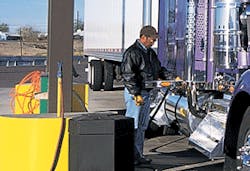The U.S. Energy Information Administration (EIA) has upwardly revised its summer fuel price forecast and has told FleetOwner that ultra-low sulfur diesel (ULSD) is now flowing from refiners to pumps nationwide, although it is now marketed as “low sulfur” at retail stations.
EIA has projected that a gallon of gasoline and diesel this summer (April 1 to Sept. 30) will cost an average of $2.88 and $2.86, respectively.
The upshot is that EIA expects in the fourth quarter of 2006 for gasoline and diesel prices to average $2.59 and $2.77, respectively. In 2007 gasoline and diesel prices will average $2.60 and $2.69, respectively which would reflect increased supplies.
Diesel fuel consumption will grow robustly—3.4% per year in 2006 and 2007—as U.S. economic growth drives up commercial transportation miles. In contrast, gasoline demand growth will be weaker at 0.7% in 2006 and 1% in 2007.
Quarterly West Texas Intermediate crude oil spot prices won’t dip below $70 for the remainder of 2006, and will hover along the $68-$69 range throughout 2007.
An EIA official told FleetOwner that ULSD, which contains no more than 15 parts per million (ppm) of sulfur versus today’s low sulfur standard (500 ppm), is flowing out of refineries in all regions with no major problems reported. On June 1, an Environmental Protection Agency (EPA) rule went into effect that required that no less than 80% of highway diesel that refiners import or produce be ULSD. On Oct. 15 the EPA rule will bring about ULSD availability at the retail level.
“The real issue is still at the distribution level,” Joanne Shore, EIA senior analyst said. Currently fuel distributors are making efforts to purge their equipment of residual sulfur that could potentially contaminate ULSD batches. That would affect a range of equipment from the main pipelines, to the tankers, to the tanks owned by the fueling stations.
“We’re seeing production of ULSD in every [region], including PADD 4 (the Rocky Mountain region),” Shore said. “That’s a relief to some folks. PADD 4 is without any pipeline access, which isolates it from drawing diesel from other regions, and they seem to be producing ULSD also. That region is served by [local refiners]. It led some people to be concerned as to whether there’d be enough ULSD in that region.”
Currently the same ULSD fuel that’s being produced by refiners is being pumped into trucks at diesel stations, although the diesel that leaves the nozzle isn’t certified ULSD, Shore said.
“Until everyone is comfortable that they can deliver uncontaminated product on a regular basis they’re not going to certify it,” Shore explained. “In general we’re not expecting the industry to be certifying it until closer to October. Right now the ULSD is moving through the system and it might not be so [contaminated] when it hits the retail level.”
For more ULSD information, go to www.clean-diesel.org
To comment on this article, write to Terrence Nguyen at [email protected]